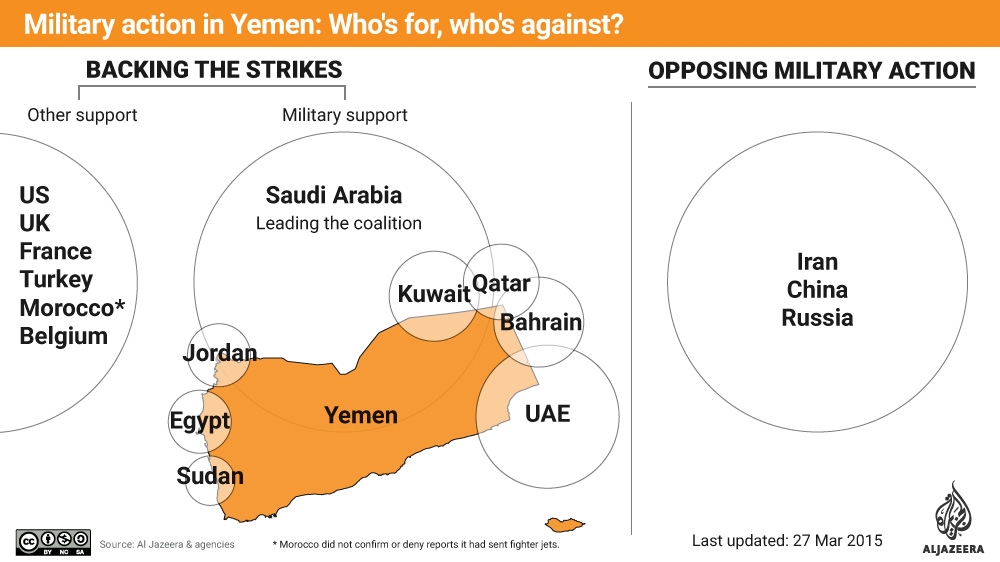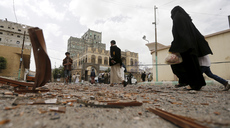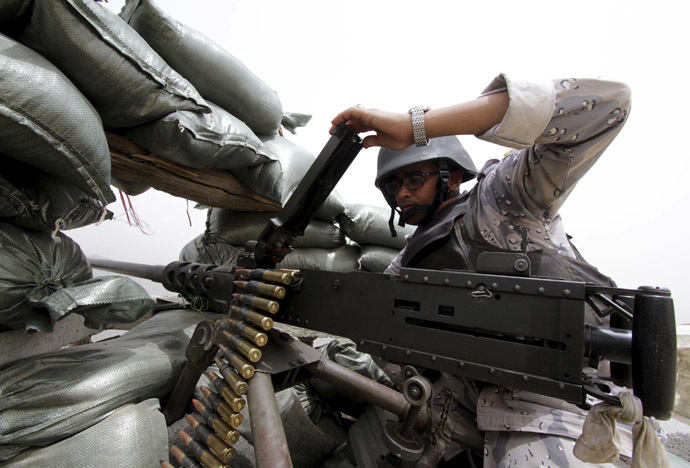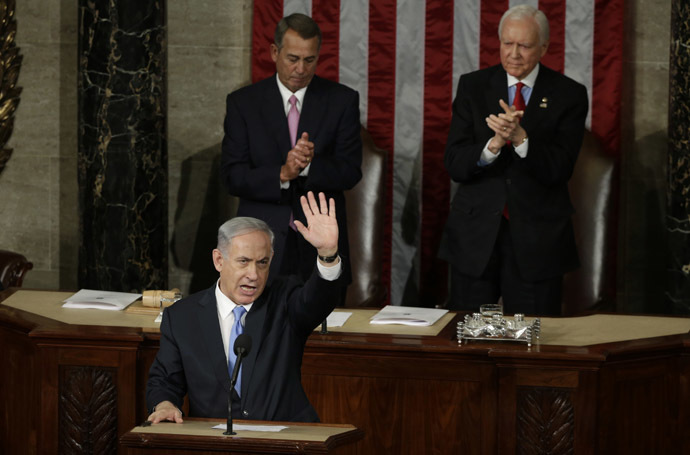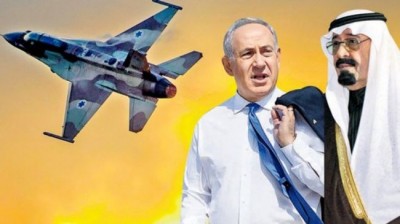
For more than half a century, Saudi Arabia has tried to use its vast oil wealth to build a lobby in the United States that could rival the imposing Israel Lobby. At top dollar, the Saudis hired law firms and PR specialists – and exploited personal connections to powerful families like the Bushes – but the Saudis never could build the kind of grassroots political organization that has given Israel and its American backers such extraordinary clout.
Indeed, Americans who did take Saudi money – including academic institutions and non-governmental organizations – were often pilloried as tools of the Arabs, with the Israel Lobby and its propagandists raising the political cost of accepting Saudi largesse so high that many people and institutions shied away.
But Saudi Arabia may have found another way to buy influence inside the United States – by giving money to Israel and currying favor with Israeli Prime Minister Benjamin Netanyahu. Over the past several years, as both Saudi Arabia and Israel have identified Iran and the so-called “Shiite crescent” as their principal enemies, this once-unthinkable alliance has become possible – and the Saudis, as they are wont to do, may have thrown lots of money into the deal.
According to a source briefed by U.S. intelligence analysts, the Saudis have given Israel at least $16 billion over the past 2 ½ years, funneling the money through a third-country Arab state and into an Israeli “development” account in Europe to help finance infrastructure inside Israel. The source first called the account “a Netanyahu slush fund,” but later refined that characterization, saying the money was used for public projects such as building settlements in the West Bank.
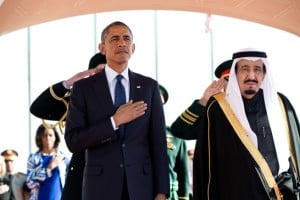
President Obama and King Salman Arabia stand at attention during the U.S. national anthem as the First Lady stands in the background with other officials. (Official White House Photo by Pete Souza)
In other words, according to this information, the Saudis concluded that if you can’t beat the Israel Lobby, try buying it. And, if that is the case, the Saudis have found their behind-the-scenes collaboration with Israel extremely valuable. Netanyahu has played a key role in lining up the U.S. Congress to fight an international agreement to resolve a long-running dispute over Iran’s nuclear program.
Urged on by Netanyahu, the Republican majority and many Democrats have committed themselves to destroying the framework agreement hammered out on April 2 by Iran and six world powers, including the United States. The deal would impose strict inspections and other limits to guarantee that Iran’s nuclear program remains peaceful.
By crashing the deal, Israel and Saudi Arabia would open the door to more punitive sanctions on Iran and possibly clear the way for Israeli airstrikes, with Saudi Arabia granting over-flight permission to Israeli warplanes. The Saudi-Israeli tandem also might hope to pull in the U.S. military to inflict even more devastation on Iranian targets.
Neither the Israeli nor Saudi governments responded to requests for comment on Saudi payments into an Israeli account.
Congressional Acclaim
The reported Saudi-to-Israel money transfers put Netanyahu’s March 3 speech to a cheering joint session of the U.S. Congress in a different light, too. The Prime Minister’s bitter denunciations of Iran before hundreds of transfixed American lawmakers could be viewed as him demonstrating his value to the Saudi royals who could never dream of getting that kind of reaction themselves.
Indeed, as Congress now moves to sabotage the Iranian nuclear agreement, the Saudis could be finding that whatever money they invested in Israel is money well spent. The Saudis seem especially alarmed that the nuclear agreement would prompt the world community to lift sanctions on Iran, thus allowing its economy – and its influence – to grow.
To prevent that, the Saudis desperately want to draw the United States in on the Sunni side of the historic Sunni-Shiite conflict, with Netanyahu serving as a crucial middleman by defying President Barack Obama on the Iran deal and bringing the full force of the Israel Lobby to bear on Congress and on the opinion circles of Official Washington.
If Netanyahu and the Saudis succeed in collapsing the Iran nuclear framework agreement, they will have made great strides toward enlisting the United States as the primary military force on the Sunni side of the Sunni-Shiite sectarian divide, a dispute that dates back to the succession struggle after Prophet Muhammad’s death in 632.
This ancient feud has become a Saudi obsession over the past several decades, at least since Iran’s Shiite revolution overthrew the Shah of Iran in 1979 and brought to power the Islamic government of Ayatollah Ruhollah Khomeini.
Upset with the ouster of a fellow monarch, the Shah, and fearing the spread of Khomeini’s ascetic form of Shiite Islamic governance, the Saudi royals summoned Iraqi dictator Saddam Hussein, a fellow Sunni, to Riyadh on Aug. 5, 1980, to encourage him to invade Iran.
According to top secret “Talking Points” that Secretary of State Alexander Haig prepared for a briefing of President Ronald Reagan after Haig’s April 1981 trip to the Middle East, Haig wrote that Saudi Prince Fahd said he told the Iraqis that an invasion of Iran would have U.S. support.
“It was … interesting to confirm that President [Jimmy] Carter gave the Iraqis a green light to launch the war against Iran through Fahd,” Haig wrote, in the document that I discovered in U.S. congressional files in 1994. Though Carter has denied encouraging the Iraqi invasion, which came as Iran was holding 52 U.S. diplomats hostage, Haig’s “Talking Points” suggest that the Saudis at least led Hussein to believe that the war had U.S. blessings.
Haig also noted that even after the overthrow of the Shah and the establishment of the Islamic state under Khomeini, Israel sought to maintain its clandestine relations with Iran by serving as an arms supplier. Haig reported that “Both [Egypt’s Anwar] Sadat and [Saudi Prince] Fahd [explained that] Iran is receiving military spares for U.S. equipment from Israel.”
Those Israeli weapons sales continued through the eight bloody years of the Iran-Iraq War with some estimates of the value reaching into the scores of billions of dollar. The Israelis even helped bring the Reagan administration into the deals in the mid-1980s with the so-called Iran-Contra arms shipments that involved secret off-the-books bank accounts in Europe and led to the worst scandal of Reagan’s presidency.
Rise of the Neocons
In the 1990s – with the Iran-Iraq war over and Iran’s treasury depleted – Israeli attitudes cooled toward its erstwhile trading partner. Meanwhile, American neocons – juiced by the demonstration of U.S. military supremacy against Iraq during the Persian Gulf War in 1991 and the collapse of the Soviet Union leaving the U.S. as “the sole superpower” – began advising Netanyahu on employing “regime change” to alter the Mideast dynamic.
During Netanyahu’s 1996 campaign, prominent neocons including Richard Perle and Douglas Feith outlined the plan in a policy paper entitled “A Clean Break: A New Strategy for Securing the Realm.” The document argued that
“Israel can shape its strategic environment … by weakening, containing, and even rolling back Syria. This effort can focus on removing Saddam Hussein from power in Iraq – an important Israeli strategic objective in its own right — as a means of foiling Syria’s regional ambitions.” [See Consortiumnews.com’s “The Mysterious Why of the Iraq War.”]
The overriding point of this neocon strategy was that by imposing “regime change” in Muslim nations that were deemed hostile to Israel, new friendly governments could be put in place, thus leaving Israel’s close-in enemies – Hamas in Palestine and Hezbollah in Lebanon – without outside sponsors. Starved of money, these troublesome enemies would be forced to accept Israel’s terms. “The Realm” would be secured.
The neocons first target was Sunni-ruled Iraq, as their Project for the New American Century made clear in 1998, but Syria and Iran were next on the hit list. Syria is governed by the Assads who are Alawites, an offshoot of Shiite Islam, and Iran is governed by Shiites. The neocon plan was to use U.S. military force or other means of subversion to take out all three regimes.
However, when the neocons got their chance to invade Iraq in 2003, they inadvertently tipped the Mideast balance in favor of the Shiites, since Iraq’s Shiite majority gained control under the U.S. military occupation. Plus, the disastrous U.S. war precluded the neocons from completing their agenda of enforced “regime change” in Syria and Iran.
With the new Iraqi government suddenly friendly with Iran’s Shiite leaders, Saudi Arabia became increasingly alarmed. Israel was also coming to view the so-called “Shiite crescent” from Tehran through Baghdad and Damascus to Beirut as a strategic threat.
Saudi Arabia, working with Turkey, took aim at the center of that crescent in 2011 by supporting a Sunni-led opposition to the government of Syrian President Bashar al-Assad, a set of protests that quickly spiraled into bloody terrorist attacks and harsh military repression.
By 2013, it was clear that the principal fighters against Assad’s government were not the fictional “moderates” touted by the U.S. mainstream media but Al-Qaeda’s Nusra Front and a hyper-brutal Al-Qaeda spinoff that arose in resistance to the U.S. occupation of Iraq and evolved into the “Islamic State of Iraq and Syria” or simply the “Islamic State.”
Israeli Preference
To the surprise of some observers, Israel began voicing a preference for Al-Qaeda’s militants over the relatively secular Assad government, which was viewed as the protectors of Alawites, Shiites, Christians and other Syrian minorities terrified of the Saudi-backed Sunni extremists.
In September 2013, in one of the most explicit expressions of Israel’s views, Israeli Ambassador to the United States Michael Oren, then a close adviser to Netanyahu, told the Jerusalem Post that Israel favored the Sunni extremists over Assad.
“The greatest danger to Israel is by the strategic arc that extends from Tehran, to Damascus to Beirut. And we saw the Assad regime as the keystone in that arc,” Oren told the Jerusalem Post in an interview. “We always wanted Bashar Assad to go, we always preferred the bad guys who weren’t backed by Iran to the bad guys who were backed by Iran.” He said this was the case even if the “bad guys” were affiliated with Al-Qaeda.
Oren expanded on his position in June 2014 at an Aspen Institute conference. Then, speaking as a former ambassador, Oren said Israel would even prefer a victory by the Islamic State, which was massacring captured Iraqi soldiers and beheading Westerners, than the continuation of the Iranian-backed Assad in Syria.
“From Israel’s perspective, if there’s got to be an evil that’s got to prevail, let the Sunni evil prevail,” Oren said.

Israeli Prime Minister Benjamin Netanyahu speaking to the United Nations General Assembly on Oct. 1, 2013. (UN Photo by Evan Schneider)
On Oct. 1, 2013, Israeli Prime Minister Netanyahu hinted at the new Israeli-Saudi relationship in his United Nations General Assembly speech, which was largely devoted to excoriating Iran over its nuclear program and threatening a unilateral Israeli military strike.
Amid the bellicosity, Netanyahu dropped in a largely missed clue about the evolving power relationships in the Middle East, saying:
“The dangers of a nuclear-armed Iran and the emergence of other threats in our region have led many of our Arab neighbors to recognize, finally recognize, that Israel is not their enemy. And this affords us the opportunity to overcome the historic animosities and build new relationships, new friendships, new hopes.”
The next day, Israel’s Channel 2 TV news reported that senior Israeli security officials had met with a high-level Gulf state counterpart in Jerusalem, believed to be Prince Bandar bin Sultan, the former Saudi ambassador to the United States who was then head of Saudi intelligence.
The reality of this unlikely alliance has even reached the mainstream U.S. media. For instance, Time magazine correspondent Joe Klein described the new coziness in an article in the Jan. 19, 2015 issue:
“On May 26, 2014, an unprecedented public conversation took place in Brussels. Two former high-ranking spymasters of Israel and Saudi Arabia – Amos Yadlin and Prince Turki al-Faisal – sat together for more than an hour, talking regional politics in a conversation moderated by the Washington Post’s David Ignatius.“They disagreed on some things, like the exact nature of an Israel-Palestine peace settlement, and agreed on others: the severity of the Iranian nuclear threat, the need to support the new military government in Egypt, the demand for concerted international action in Syria. The most striking statement came from Prince Turki. He said the Arabs had ‘crossed the Rubicon’ and ‘don’t want to fight Israel anymore.’”
While the Saudis may still pay lip service to the plight of the Palestinians, that issue is no longer much of a priority. Indeed, the Saudi royals may view the Palestinians, many of whom are secular having seen first-hand the evils of Islamic extremism, as something of a regional threat to the Saudi monarchical governance which is based on an ultra-fundamentalist form of Islam known as Wahhabism. That some of the reported $16 billion Saudi payment to Israel was going to finance Israeli settlements on the Palestinian West Bank would further reflect this Saudi indifference.
In 2013, again collaborating with Israel, Saudi Arabia helped deal a devastating blow to the 1.8 million Palestinians locked in the Gaza Strip. They had received some relief when Egypt elected the Muslim Brotherhood government of President Mohamed Morsi, who relaxed the embargo on passage between Egyptian territory and Gaza.
But the Saudis saw the populist Muslim Brotherhood as a threat to monarchical rule and Israel was angry over Morsi’s apparent sympathy for Hamas, the party ruling Gaza. So, Saudi Arabia and Israel supported a military coup which removed Morsi from power. The two countries then showed off their complementary powers: the Saudis helped the government of General Abdel Fattah el-Sisi with money and oil, while Israel had its lobby work the corridors of power in Washington to prevent retaliation for the ouster of an elected government.
Back to Syria
Israel’s growing collaboration with Saudi Arabia and the two governments’ mutual hatred of the “Shiite crescent” have extended into a tacit alliance with Al-Qaeda’s Nusra Front in Syria, with which the Israelis have what amounts to a non-aggression pact, even caring for Nusra fighters in Israeli hospitals and mounting lethal air attacks against Lebanese and Iranian advisers to the Syrian military.
Israel’s preference for the Saudi-backed jihadists over Iranian allies in Syria was a little-noticed subtext of Israeli Prime Minister Netanyahu’s address to Congress on March 3, urging the U.S. government to shift its focus from fighting Al-Qaeda and the Islamic State to fighting Iran. He trivialized the danger from the Islamic State with its “butcher knives, captured weapons and YouTube” compared to Iran, which he accused of “gobbling up the nations” of the Middle East.
To the applause of Congress, he claimed “Iran now dominates four Arab capitals, Baghdad, Damascus, Beirut and Sanaa. And if Iran’s aggression is left unchecked, more will surely follow.” His choice of capitals was peculiar, however, because Iran took none of those capitals by force and, indeed, was simply supporting the embattled government of Syria and was allied with Shiite elements of the government of Lebanon.
As for Iraq, Iran’s allies were installed not by Iran but by President George W. Bush via the U.S. invasion. And, in Yemen, a long-festering sectarian conflict has led to the capture of Sanaa by Houthi rebels who are Zaydi Shiites, an offshoot of Shia Islam that is actually closer to some Sunni sects.
The Houthis deny that they are agents of Iran, and Western intelligence services believe that Iranian support has consisted mostly of some funding. Former CIA official Graham E. Fuller has called the notion “that the Houthis represent the cutting edge of Iranian imperialism in Arabia – as trumpeted by the Saudis” a “myth.” He added:
“The Zaydi Shia, including the Houthis, over history have never had a lot to do with Iran. But as internal struggles within Yemen have gone on, some of the Houthis have more recently been happy to take Iranian coin and perhaps some weapons — just as so many others, both Sunni and Shia, are on the Saudi payroll. The Houthis furthermore hate al-Qaeda and hate the Islamic State.”
Indeed, the Saudi airstrikes, which have reportedly killed hundreds of Yemeni civilians, have aided the Yemen-based “Al-Qaeda in the Arabian Peninsula” by limiting Houthi attacks on the terrorists and enabling AQAP to overrun a prison and free scores of its militants.
But President Obama, recognizing the joint power of the Saudis and Israelis to destroy the Iran nuclear deal, authorized support for the Saudi airstrikes from U.S. intelligence while rushing military resupplies to the Saudis. In effect, Obama is trading U.S. support for Saudi aggression in a neighboring country for what he hopes might be some political space for the Iran-nuclear agreement.
New Terrorist Gains
Saudi Arabia and its Persian Gulf allies, along with Turkey, are also ramping up support in Syria for Al-Qaeda’s Nusra Front and the Islamic State. Flush with jihadist reinforcements, the two terrorist organizations have seized new territory in recent weeks, including the Islamic State creating a humanitarian crisis by attacking a Palestinian refugee camp south of Damascus.
All of these Saudi actions have drawn minimal criticism from mainstream U.S. media and political circles, in part, because the Saudis now have the protection of the Israel Lobby, which has kept American attention on the supposed threat from Iran, including allegedly controversial statements from Iranian leaders about their insistence that economic sanctions be lifted once the nuclear agreement is signed and/or implemented.
Neocon warmongers have even been granted space in major U.S. newspapers, including the Washington Post and the New York Times, to openly advocate for the bombing of Iran despite the risk that destroying Iran’s nuclear reactors could inflict both human and environmental devastation. That might serve the Saudi-Israeli interests by forcing Iran to focus exclusively on a domestic crisis but it would amount to a major war crime. [See Consortiumnews.com’s “NYT Publishes Call to Bomb Iran.”]
The strategic benefit for Israel and Saudi Arabia would be that with Iran unable to assist the Iraqis and the Syrians in their desperate struggles against Al-Qaeda and the Islamic State, the Sunni jihadists might well be hoisting the black flag of their dystopian philosophy over Damascus, if not Baghdad. [See Consortiumnews.com’s “The Secret Saudi Ties to Terrorism.”]
Beyond the slaughter of innocents that would follow – and the likelihood of new terrorist attacks on the West – such a victory would almost surely force whoever is the U.S. president to recommit hundreds of thousands of U.S. troops to remove Al-Qaeda or the Islamic State from power. It would be a war of vast expense in money and blood with little prospect of American success.
If Saudi Arabia’s petrodollars helped secure Israel’s assistance in creating such a potential hell on earth, the Saudi royals might consider it the best money they ever spent – and the resulting orgy of military spending by the U.S. government might benefit some well-connected neocons, too – but the many victims of this madness would certainly feel otherwise as might the vast majority of the American people.
Investigative reporter Robert Parry broke many of the Iran-Contra stories for The Associated Press and Newsweek in the 1980s. You can buy his latest book, America’s Stolen Narrative, either in print here or as an e-book (from Amazon and barnesandnoble.com). You also can order Robert Parry’s trilogy on the Bush Family and its connections to various right-wing operatives for only $34. The trilogy includes America’s Stolen Narrative. For details on this offer, click here.
